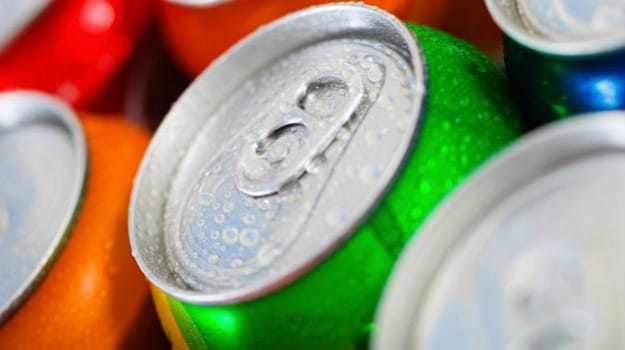Image via ThinkstockPublic health advocates who push for taxes on soda say any reduction in sugary drinks can help fight obesity, diabetes and tooth decay. Yet most soda taxes treat all sugary drinks as if they have the same amount of sugar.That’s the structure of Mexico’s soda tax, which went into effect in 2014 and is being closely watched by researchers. It’s also a feature of the soda tax in Berkeley, California, the first American city to pass one. Those taxes apply a surcharge on every liter or ounce of sugary drink, no matter how much sugar it has.
A new soda tax in Britain, expected to become law, is different. The British tax won’t treat a full-calorie soda and a lightly sweetened iced tea in the same way. Instead, it imposes its tax in three brackets.Sugar-free and low-sugar products, those with less than around 3 teaspoons of sugar for a 12-ounce can, are not subject to any additional tax. Products with between 3 and 5 teaspoons, approximately, will pay a lower tax of around 9 cents for that can. Products like a standard cola, with more than 9 teaspoons in a can, will pay more, about 12 cents.The result is a slightly more complicated tax structure, but one that might provide some incentives for beverage makers to offer healthier products. Donald Marron, an institute fellow at the Urban Institute who studies tax policy, said the tiered prices might steer price-sensitive customers from high-sugar drinks to lower-sugar ones. But he thinks its bigger effect could be encouraging companies to develop innovative drinks for the lower-tax category.“If there are small changes they can make to get under the threshold without really affecting mouth-feel and taste, they may well do that,” he said. In a recent blog post, he hailed the British idea as a “better soda tax.”Marron makes his own midcalorie products, he said, by mixing diet and regular sodas at soda fountains. But big soda companies have begun experimenting with more professional versions of this idea.Coca-Cola and Pepsi have recently released lower-calorie versions of their flagship sodas without eliminating sugar entirely. Coca-Cola Life, Pepsi Next and Pepsi True each have about two-thirds as many calories as the originals. The companies also offer lower-sugar products in other categories, like iced teas.The beverage industry has introduced these products in response to consumer demand for healthier drinks. But they have also been spurred by a voluntary pledge to lower the calorie counts in their beverages by 20 percent before 2025 in the United States.The soda companies, naturally, oppose soda taxes. But a tax like the British one might give them more of a window to develop and sell these newer products. The British government says this is its hope, pointing to some beverage companies that have already reduced sugar levels.“The independent Office for Budget Responsibility expects that producers will change their behavior as a result of this levy, which will mean that the consumption of high-added-sugar soft drinks should fall over time,” the treasury said in a fact sheet it released.In the United States, consumption of full-calorie soda is already declining. American consumption of soda has dropped more than 25 percent since the late 1990s, a trend that is contributing to an overall decline in the number of calories consumed by the average American.In general, sin taxes have tended to follow the model of Berkeley’s soda tax. Alcohol taxes are usually imposed by category and volume, not the proof of the drink. But there is one famous example of a tax proposal along the lines of the British soda tax: the carbon tax.That tax, as it is discussed by economists, is focused on the amount of the damaging ingredient — carbon — not the product that contains it. Under a carbon tax formula, people who get energy from coal, a high-carbon fossil fuel, would pay more than those who get energy from natural gas, which emits less carbon.The result, in theory, is getting people to focus on reducing the harmful ingredient, not its vehicle.© 2016 New York Times News Service
A new soda tax in Britain, expected to become law, is different. The British tax won’t treat a full-calorie soda and a lightly sweetened iced tea in the same way. Instead, it imposes its tax in three brackets.Sugar-free and low-sugar products, those with less than around 3 teaspoons of sugar for a 12-ounce can, are not subject to any additional tax. Products with between 3 and 5 teaspoons, approximately, will pay a lower tax of around 9 cents for that can. Products like a standard cola, with more than 9 teaspoons in a can, will pay more, about 12 cents.The result is a slightly more complicated tax structure, but one that might provide some incentives for beverage makers to offer healthier products. Donald Marron, an institute fellow at the Urban Institute who studies tax policy, said the tiered prices might steer price-sensitive customers from high-sugar drinks to lower-sugar ones. But he thinks its bigger effect could be encouraging companies to develop innovative drinks for the lower-tax category.“If there are small changes they can make to get under the threshold without really affecting mouth-feel and taste, they may well do that,” he said. In a recent blog post, he hailed the British idea as a “better soda tax.”Marron makes his own midcalorie products, he said, by mixing diet and regular sodas at soda fountains. But big soda companies have begun experimenting with more professional versions of this idea.Coca-Cola and Pepsi have recently released lower-calorie versions of their flagship sodas without eliminating sugar entirely. Coca-Cola Life, Pepsi Next and Pepsi True each have about two-thirds as many calories as the originals. The companies also offer lower-sugar products in other categories, like iced teas.The beverage industry has introduced these products in response to consumer demand for healthier drinks. But they have also been spurred by a voluntary pledge to lower the calorie counts in their beverages by 20 percent before 2025 in the United States.The soda companies, naturally, oppose soda taxes. But a tax like the British one might give them more of a window to develop and sell these newer products. The British government says this is its hope, pointing to some beverage companies that have already reduced sugar levels.“The independent Office for Budget Responsibility expects that producers will change their behavior as a result of this levy, which will mean that the consumption of high-added-sugar soft drinks should fall over time,” the treasury said in a fact sheet it released.In the United States, consumption of full-calorie soda is already declining. American consumption of soda has dropped more than 25 percent since the late 1990s, a trend that is contributing to an overall decline in the number of calories consumed by the average American.In general, sin taxes have tended to follow the model of Berkeley’s soda tax. Alcohol taxes are usually imposed by category and volume, not the proof of the drink. But there is one famous example of a tax proposal along the lines of the British soda tax: the carbon tax.That tax, as it is discussed by economists, is focused on the amount of the damaging ingredient — carbon — not the product that contains it. Under a carbon tax formula, people who get energy from coal, a high-carbon fossil fuel, would pay more than those who get energy from natural gas, which emits less carbon.The result, in theory, is getting people to focus on reducing the harmful ingredient, not its vehicle.© 2016 New York Times News Service
Advertisement








